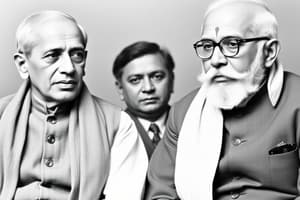Podcast
Questions and Answers
When was Dadabhai Naoroji born?
When was Dadabhai Naoroji born?
September 4, 1825
What was the name of Dadabhai Naoroji's father?
What was the name of Dadabhai Naoroji's father?
- Orlebar
- Maneckbai
- Erskine Perry
- Naoroji Palanji Dordi (correct)
Dadabhai Naoroji was the first Indian to become a Professor of Mathematics and Natural Philosophy at the Elphinstone Institution.
Dadabhai Naoroji was the first Indian to become a Professor of Mathematics and Natural Philosophy at the Elphinstone Institution.
True (A)
What societal issue did Dadabhai Naoroji focus on for reform?
What societal issue did Dadabhai Naoroji focus on for reform?
Dadabhai Naoroji began free literacy classes for girls in ______.
Dadabhai Naoroji began free literacy classes for girls in ______.
Which institution did Dadabhai Naoroji receive his higher education from?
Which institution did Dadabhai Naoroji receive his higher education from?
Dadabhai Naoroji faced no resistance when starting women's education classes.
Dadabhai Naoroji faced no resistance when starting women's education classes.
What was the reaction of the Governor of Bombay towards Dadabhai's work in women's education?
What was the reaction of the Governor of Bombay towards Dadabhai's work in women's education?
What impact did British colonial rule have on the Indian rajas and maharajas during Naoroji's lifetime?
What impact did British colonial rule have on the Indian rajas and maharajas during Naoroji's lifetime?
How did Dadabhai Naoroji contribute to the awakening of the Indian populace?
How did Dadabhai Naoroji contribute to the awakening of the Indian populace?
What was the primary aim of the British concerning India during Naoroji's lifetime?
What was the primary aim of the British concerning India during Naoroji's lifetime?
What unique challenges did Naoroji face in articulating India's plight during British rule?
What unique challenges did Naoroji face in articulating India's plight during British rule?
What characterized the British approach to ruling India compared to earlier invaders?
What characterized the British approach to ruling India compared to earlier invaders?
What was the main reason for the Parsi elders' refusal to fund Dadabhai's education in England?
What was the main reason for the Parsi elders' refusal to fund Dadabhai's education in England?
What was the initial response of the orthodox community to Dadabhai's initiative for women's education?
What was the initial response of the orthodox community to Dadabhai's initiative for women's education?
Which of the following best describes Dadabhai's position at the Elphinstone Institution after his promotion?
Which of the following best describes Dadabhai's position at the Elphinstone Institution after his promotion?
How did Dadabhai secure the resources necessary for starting girls' schools after the initial funding?
How did Dadabhai secure the resources necessary for starting girls' schools after the initial funding?
What impact did Dadabhai's work in women's education have on the community in the long run?
What impact did Dadabhai's work in women's education have on the community in the long run?
Flashcards
Dadabhai Naoroji's birth year
Dadabhai Naoroji's birth year
Dadabhai Naoroji was born in 1825.
Naoroji's early education
Naoroji's early education
He received his higher education at Elphinstone Institution in Bombay.
Naoroji's role as a mathematician
Naoroji's role as a mathematician
Naoroji was the first Indian professor of Mathematics and Natural Philosophy at Elphinstone Institution.
Naoroji's social reform work
Naoroji's social reform work
Signup and view all the flashcards
Education for girls in 1849
Education for girls in 1849
Signup and view all the flashcards
Dnyan Prasarak Mandali
Dnyan Prasarak Mandali
Signup and view all the flashcards
Rast Goftar newspaper
Rast Goftar newspaper
Signup and view all the flashcards
Naoroji's work in England
Naoroji's work in England
Signup and view all the flashcards
East India Association
East India Association
Signup and view all the flashcards
Indian National Congress (INC)
Indian National Congress (INC)
Signup and view all the flashcards
Grand Old Man of India
Grand Old Man of India
Signup and view all the flashcards
Naoroji's death year
Naoroji's death year
Signup and view all the flashcards
Bombay Association
Bombay Association
Signup and view all the flashcards
Imperial Parliament Membership
Imperial Parliament Membership
Signup and view all the flashcards
Political Challenges Naoroji Faced
Political Challenges Naoroji Faced
Signup and view all the flashcards
Royal Commission on Indian expenditure
Royal Commission on Indian expenditure
Signup and view all the flashcards
Colonial Exploitation
Colonial Exploitation
Signup and view all the flashcards
Indian Independence Movement
Indian Independence Movement
Signup and view all the flashcards
Study Notes
Dadabhai Naoroji's Life and Work
- Dadabhai Naoroji was born in Bombay, India, in 1825.
- He was raised by his mother, Maneckbai, after his father passed away when he was young.
- He excelled in his studies, displaying exceptional intelligence, particularly in mathematics.
- He received his higher education at the Elphinstone Institution in Bombay.
- He became the first Indian professor of Mathematics and Natural Philosophy at Elphinstone Institution.
- He believed in social reform and women's rights.
- Dadabhai established free literacy classes for girls in 1849, despite facing resistance from traditional communities.
- He persistently campaigned for education for girls, leading to the development of girls' schools, ultimately changing social norms, and receiving recognition from the Governor of Bombay.
- His work was celebrated as a crucial milestone in the history of education in the Bombay Presidency.
- He actively challenged other forms of social injustice faced by women in India at the time.
- He established the Dnyan Prasarak Mandali (Society for Promotion of Knowledge) for the education of adult men.
- He also worked to empower the Parsi community by starting a newspaper called "Rast Goftar" (The Voice of Truth).
- In 1855, he traveled to England to work as a successful businessman while advocating for Indian rights.
- He became an influential member of the East India Association, advocating for Indian self-rule.
- He founded the Indian National Congress (INC) in 1885.
- He played a key role in the Indian independence movement and fought against colonial exploitation through economic analysis and political advocacy.
- He is known as the "Grand Old Man of India" for his unwavering dedication to India's freedom.
- He passed away in 1917 at the age of 92.
Dadabhai Naoroji: Early Life and Education
- Born on September 4, 1825, in a poor Parsi family in Bombay.
- His father, Naoroji Palanji Dordi, died when he was four years old.
- His mother, Maneckbai, raised him despite being illiterate herself.
- Exhibited exceptional intelligence and skill in mental arithmetic at school.
- Received higher education at the Elphinstone Institution in Bombay, excelling in English and Mathematics.
- Professor Orlebar, his teacher, called him "the promise of India."
- Sir Erskine Perry, the Chief Justice of Bombay, offered to pay for his studies in England, but it was declined due to concerns about his conversion to Christianity.
- Became the first Indian to hold the post of Professor of Mathematics and Natural Philosophy at the Elphinstone Institution.
Dadabhai Naoroji: Social Reformer
- Believed in the equality of men and women.
- Started free literacy classes for girls in Marathi and Gujarati in 1849, facing initial resistance from orthodox society.
- Established the Dnyan Prasarak Mandali (Society for Promotion of Knowledge) for the education of adult men.
- Founded various organizations including the Widow Remarriage Association, Parsi Gymnasium, and Temperance Societies.
- Established the fortnightly journal Rast Guftar (Truth Teller) in Gujarati to promote progressive ideas.
Dadabhai Naoroji: Political Activism
- Played a leading role in opposing the renewal of the East India Company's charter in 1852.
- Co-founded the Bombay Association, the first political organization in Bombay Presidency.
- Became the first Indian member of the Imperial Parliament in 1892, representing Central Finsbury.
- Established himself as a mature parliamentarian, speaking on issues relating to currency, exchange, and finance.
- Advocate for Indians in South Africa and Indian students in England.
- Secured a resolution for holding the preliminary examination for the I.C.S. simultaneously in India and England.
- Appointed to the Royal Commission on Indian expenditure (Wilby Commission) in 1895, advocating for a fairer distribution of administrative and military expenditure between England and India.
Dadabhai Naoroji: Retirement and Legacy
- Retired from active public life in 1907, despite his ongoing fight for self-rule.
- Continued to be consulted on political and economic issues relating to India.
- Revered as the "Grand Old Man of India" for his selfless patriotism and commitment to India's welfare.
- Advocate of non-violent and constitutional methods for achieving Indian independence.
- Founded numerous voluntary organizations in India and England.
- His perseverance and undaunted spirit in challenging British rule garnered respect from both friends and adversaries.
Studying That Suits You
Use AI to generate personalized quizzes and flashcards to suit your learning preferences.




